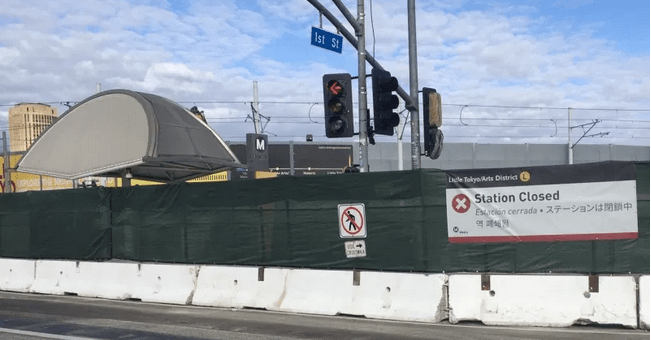As of last Saturday, the Little Tokyo/Arts District Station on the Metro L Line (Gold) is closed.
Forever.
The somewhat-out-of-the-way station is being demolished to make way for a new and better-located underground station nearby, scheduled to open in 2022.
The closure is part of Metro's Regional Connector subway construction. For the next two years, Metro crews will be tying the L Line tracks into the new light rail subway, finishing subway construction, and then testing. When completed, the Regional Connector will mean one-seat rides from Azusa to Long Beach, and from East L.A. to Santa Monica.
Right now, though, the construction means that a portion of the L Line is closed for nearly two years - between Union Station and Pico/Aliso Station.
Metro's announcement of the 22-month closure focuses mostly on letting riders know about a temporary bus bridge that stops at Pico/Aliso, Little Tokyo, and Union Station.
Metro is bridging the L Line closure with a shuttle bus that spans from Pico/Aliso Station to Union Station (Patsaouras Plaza bus bay 5), with two intermediate stops in Little Tokyo: 1st Street at Vignes Street, and 1st Street at San Pedro Street. The shuttle runs the same frequency as the L Line: every 12 minutes during the day, and every 20 minutes during early morning and late evening. Metro bus lines 30 (where shortline routes now go to Union Station) and 40, and LADOT DASH line D also make connections between Union Station, Little Tokyo, and Pico/Aliso.
The shuttle is necessary and likely to serve Metro's core riders. There is another option that will be appealing for some riders: Metro Bike Share.
Bike-share isn't for everyone. It doesn't, for example, serve families - because all riders must be 16 or older. Though bike-share offers an added mobility alternative during the construction, its expansion eastward is also seen as another aspect of the rampant gentrification bearing down on Boyle Heights neighborhoods, displacing longtime residents.
Metro's announcement doesn't mention new bike-share options, though Metro Bike Share stations are shown on Metro's map (above.)
There are two newly-opened bike-share docking stations that are especially useful during the closure - especially for trips starting and ending at Union Station and Pico/Aliso Station.
Metro has a new bike-share docking station at the L Line's Pico/Aliso Station. These are the first bike-share docks in Boyle Heights, the first east of the L.A. River.
There are also new bike-share docks at Metro's newly opened César Chávez Transit Pavilion, located across the street immediately east of Union Station - at the southeast corner of César Chávez Avenue and Vignes Street. For a few years, Union Station has had docks located in the front (west side) of the facility, though those bikes are about a quarter-mile walk from Patsaouras Plaza bus stops located at the east end of Union Station.
There are also several bike-share docking spots in Little Tokyo, including the ones in front of the Japanese American National Museum - nearly across the street from the closed Little Tokyo Station.
The bike-share ride from Union Station to Pico/Aliso is just one mile. The shortest route would include Mission Road which is an uncomfortable ride, due to a lot of freeway onramps. A recommend fairly-short route that includes relatively quiet streets would be:
- Ride on the sidewalk (legal in the city of L.A.) south from Chávez Pavilion - toward the 110 Freeway.
- Cross the street (toward Denny's), turn left onto Ramírez Street, continue under the freeway.
- Continue forward - Ramírez turns into Center Street.
- Turn right onto Banning Street.
- Turn left onto Vignes Street.
- Turn left onto 1st Street - cross the river - and the bike-share docks are just past Pico/Aliso Station, on the left.
Use the directions in reverse to get from Pico/Aliso to Union Station. That route is also useful for going to/from Union Station and the Arts District, though instead of turning right on Banning, continue south on Center as it goes under 1st Street and turns into Santa Fe Avenue. Riding from Union Station into the eastern portion of Little Tokyo is easiest taking Metro Bike Share from the front of Union Station - go south on the Los Angeles Street protected bike lanes.
What Metro has made somewhat tricky is getting directly from Pico/Aliso into Little Tokyo via 1st Street.
As Streetsblog reported in 2019, during Regional Connector construction there are tracks diagonally crossing 1st Street. It is dangerous to bike across railroad tracks at a diagonal, as bike tires can get caught in the gap in the tracks. After Metro tracks on 1st Street resulted in a few cyclist crashes, rather than make the street safe for bicycling, Metro put up lots of signage directing cyclists to take an alternative, circuitous route. Many experienced cyclists continue to take 1st Street, but less intrepid cyclists should probably follow Metro detour signage.
Right now the tracks diagonally crossing 1st Street are no longer in use. Perhaps Metro could remove them or, at least, quickly cover a portion of them to make 1st Street safe for westbound cyclists.
For more information about Metro Bike Share, visit their website or download the iPhone or Android app. A single ride costs $1.75. Daily, weekly, monthly and yearly passes are also available. Reduced fare bike-share is available for seniors, persons with disabilities, and students (16 and older.)






